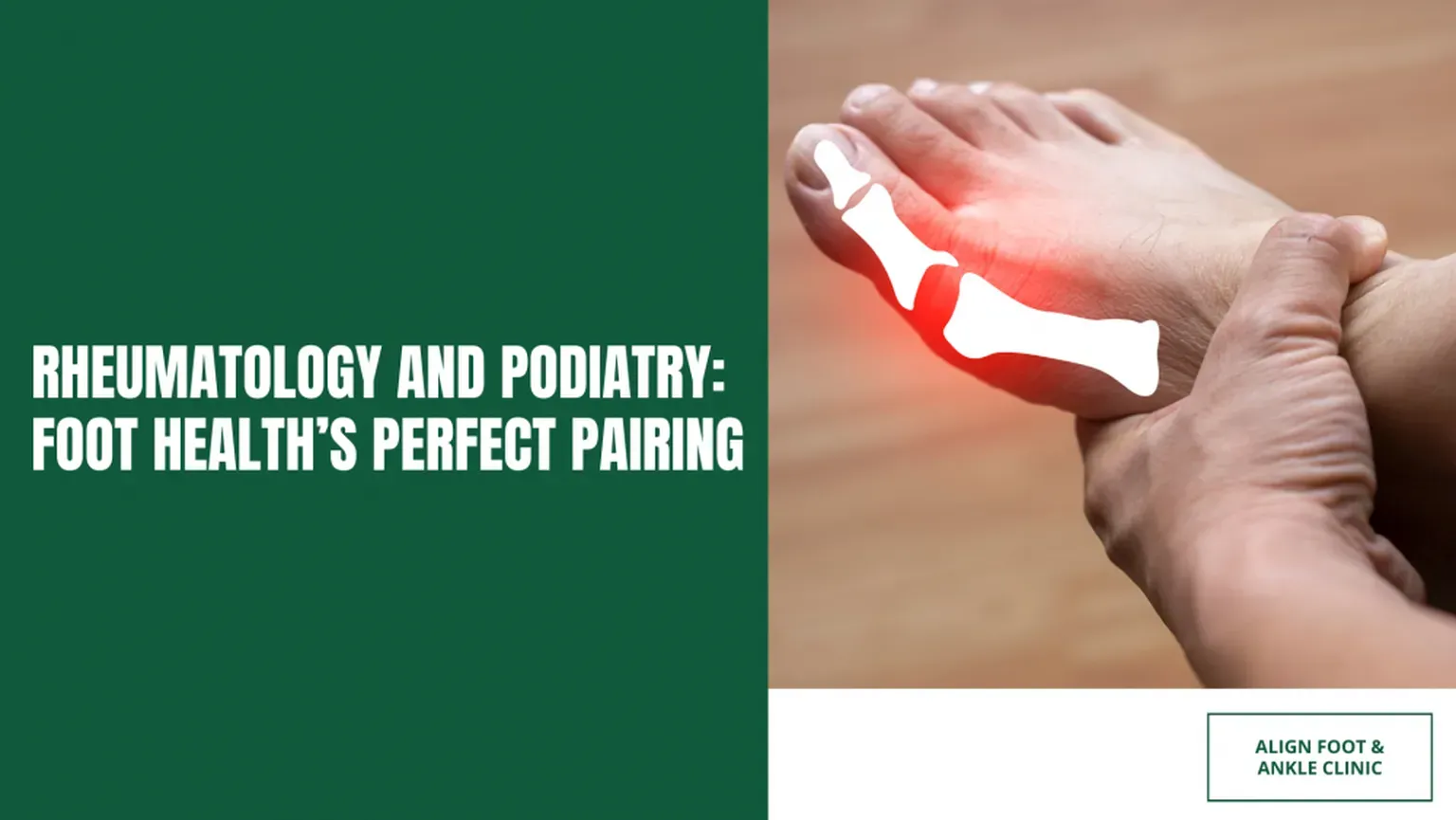RHEUMATOLOGY AND PODIATRY: FOOT HEALTH’S PERFECT PAIRING
WE UNDERSTAND THAT THE PARTNERSHIP BETWEEN RHEUMATOLOGY AND PODIATRY IS INSTRUMENTAL IN ENSURING YOUR FOOT HEALTH. IN THIS BLOG POST, WE’LL DIVE INTO THE ESSENTIAL COLLABORATION BETWEEN THESE SPECIALTIES AND HOW IT CONTRIBUTES TO YOUR OVERALL WELL-BEING.
Welcome to Align Foot & Ankle Clinic, where we understand that the partnership between rheumatology and podiatry is instrumental in ensuring your foot health. In this blog post, we’ll dive into the essential collaboration between these specialties and how it contributes to your overall well-being.
Understanding the Connection Between Rheumatology and Podiatry
Rheumatology and podiatry may seem like separate realms of medicine, but they frequently intersect, especially when it comes to diagnosing and treating conditions affecting the feet. Here, we’ll explore this dynamic duo’s critical role in preserving and enhancing your foot health.
1. Rheumatology’s Expertise
Rheumatologists specialize in autoimmune and inflammatory conditions that affect joints throughout the body. These conditions can often manifest in the feet and ankles, causing pain, swelling, and discomfort. Common conditions include rheumatoid arthritis, gout, lupus, and psoriatic arthritis. Rheumatologists specialize in:
- Diagnosing systemic conditions with foot involvement.
- Developing targeted treatment plans to manage inflammation and pain.
- Monitoring disease progression and treatment effectiveness.
2. Podiatry’s Foot-Focused Care
Podiatrists are foot and ankle specialists who diagnose, treat, and prevent a wide range of conditions affecting these areas. Their expertise extends to:
- Addressing foot deformities and joint issues caused by arthritic or inflammatory conditions.
- Treating skin conditions, wounds, and infections often associated with these autoimmune or inflammatory conditions
- Prescribing custom orthotic devices to enhance foot function and alleviate pain.
- Performing surgical interventions to correct deformities or manage advanced conditions.
Collaborative Care: Why It Matters
Collaboration between rheumatologists and podiatrists is vital for providing holistic care to individuals with foot issues linked to rheumatic conditions. Here are key reasons why this partnership is essential:
1. Early Detection and Intervention
Many rheumatologic diseases can initially present with foot and ankle symptoms. The collaboration between specialists enables early diagnosis and timely intervention, potentially preventing irreversible joint damage or deformities.
2. Targeted Treatment Plans
Rheumatologists tailor treatment plans to manage the underlying autoimmune or inflammatory condition. Podiatrists complement these efforts by addressing specific foot-related symptoms and issues, ensuring a comprehensive approach to care.
3. Enhanced Quality of Life
Managing pain and preserving foot function are paramount for individuals with rheumatic diseases. The collaborative approach optimizes treatment outcomes, leading to an improved quality of life and greater mobility.
Conditions That Benefit from Collaboration
Several conditions commonly benefit from the collaboration between rheumatology and podiatry:
- Rheumatoid Arthritis (RA): RA frequently affects the joints in the feet and ankles, leading to pain, deformities, and decreased mobility. Collaboration helps manage these symptoms and prevent joint destruction.
- Gout: Gout commonly affects the big toe joint, causing severe pain and inflammation. Rheumatologists manage the underlying uric acid levels, while podiatrists address acute symptoms and provide guidance on lifestyle changes.
- Lupus: Lupus can cause joint pain and inflammation in the feet. Rheumatologists oversee systemic management, while podiatrists help manage foot-related complications.
- Psoriasis: Psoriasis can affect the skin on the feet, potentially causing discomfort and skin changes. A collaborative approach ensures comprehensive care for psoriasis-related foot issues.
- Psoriatic Arthritis: Psoriatic arthritis targets the joints, including those in the feet. Coordination between specialists addresses the specific challenges of this condition.
- Osteoarthritis: This degenerative joint disease can affect the feet, causing pain and stiffness. Rheumatologists and podiatrists work together to manage symptoms and improve foot function.
Your Path to Collaborative Foot Care
As a patient, your active involvement is key to successful collaborative care:
- Open Communication: Share all relevant medical information and concerns with both your rheumatologist and podiatrist.
- Regular Check-ups: Attend scheduled appointments and follow-up visits with both specialists as recommended.
- Foot Self-Care: Follow your podiatrist’s guidance for foot hygiene and self-examinations.
To discuss a treatment plan tailored to your needs, schedule an appointment with Dr. Ho-Ellsworth by visiting our website or calling us at (512) 882-4911. Don’t forget to check out our socials for valuable insights and updates:
At Align Foot & Ankle Clinic, we’re committed to providing you with comprehensive care and ensuring that your feet receive the attention they deserve. Together with our dedicated Align team led by Dr. Ho-Ellsworth, you can progress with greater assurance toward enhanced foot health and an overall better quality of life.



